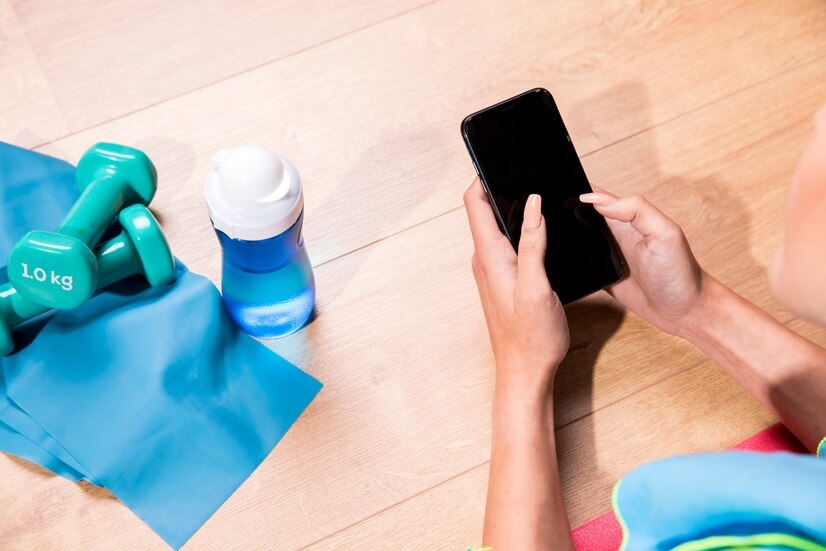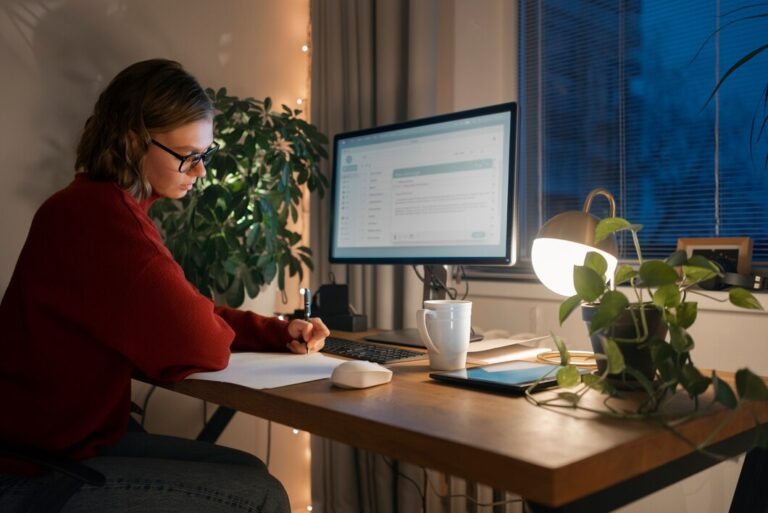
When was the last time you went an entire hour—let alone a full day—without glancing at a screen? If the thought sends a jolt of anxiety through you, you’re not alone. The average person now spends nearly seven hours a day staring at screens, a number that has skyrocketed in recent years. This constant digital tether is leaving us feeling drained, distracted, and disconnected from the world around us. This article introduces you to empowering Weekend Digital Detox Challenges designed to help you sever that cord, even if just for 48 hours, and reclaim your mental clarity.
This isn’t just about turning your phone off; it’s about turning your life back on. We’ll guide you through a practical, step-by-step plan to not only survive but thrive during a weekend unplugged. Forget feeling bored or anxious; you’ll discover how to replace mindless scrolling with mindful living.
We’ll explore the profound science-backed benefits for your brain and well-being, confront the uncomfortable withdrawal symptoms head-on, and provide you with a concrete framework for a successful and rejuvenating 48-hour reset. Prepare to rediscover the world beyond the glow of your screen.

The Tyranny of the Notification: Why You Urgently Need a Break
Before diving into the “how,” let’s confront the “why.” Our brains are not designed for the relentless barrage of information and stimulation that our devices deliver. Every ping, buzz, and notification is a micro-interruption, hijacking our attention and pulling us out of the present moment.
This constant state of alert triggers our sympathetic nervous system—our “fight or flight” response—leading to elevated levels of the stress hormone, cortisol. Over time, this chronic digital stress can lead to a host of issues, including anxiety, burnout, and sleep disturbances.
Think of your attention as a finite resource, like a glass of water. Every time you check an email, scroll through a feed, or react to a notification, you’re pouring a little bit of that water out. By the end of the day, it’s no wonder you feel empty and depleted.
A 2025 study highlighted that adults exceeding just five hours of daily screen time have a significantly higher risk of developing symptoms of anxiety and depression. A weekend digital detox is your opportunity to stop the leaks and refill your glass.
It’s a conscious act of rebellion against the attention economy, a system designed to monetize your focus. By choosing to unplug, you are making a powerful statement: my attention belongs to me.
This isn’t about demonizing technology. It’s about re-establishing a healthy hierarchy where technology serves you, not the other way around. A 48-hour detox acts as a powerful “pattern interrupt,” breaking the compulsive cycles of checking and scrolling.
It allows your overstimulated brain to rest and reset, much like giving a tired muscle a chance to recover. You’ll be amazed at how quickly your mind begins to quiet down and how your ability to focus on a single task deepens when you’re not constantly being pulled in a dozen different directions.
Your 48-Hour Unplugged Blueprint: A Step-by-Step Weekend Digital Detox Challenge
Embarking on one of these Weekend Digital Detox Challenges can feel daunting, but with a little preparation, it can be a deeply rewarding experience. This isn’t about rigid rules; it’s about creating a flexible framework that works for you. The goal is reconnection—with yourself, with your loved ones, and with the physical world.

The “Reconnect and Recharge” Framework:
Friday Evening: The Wind-Down (Preparation is Everything)
- Set Your Intention: Why are you doing this? Is it to be more present with your family, to finish a book, or simply to quiet your mind? Write it down and place it somewhere you can see it.
- Inform Your Circle: Let your close friends and family know that you’ll be largely unreachable for the weekend. This manages their expectations and frees you from the guilt of not responding. Set up an emergency contact plan (e.g., “If it’s a true emergency, call my landline/partner’s phone”).
- The “Digital Tuck-In”: About an hour before you plan to go to sleep, put all your devices away. Don’t just silence them; put them in a drawer in another room. This physical separation is crucial. It signals to your brain that the day is over.
- Prepare Your Analog Arsenal: Lay out the tools for your unplugged weekend. This could be a stack of books, a journal and pen, a board game, a puzzle, or your walking shoes. Having these things ready removes friction and makes it easier to choose an analog activity over a digital one.
Saturday: The Immersion (Embrace the Freedom)
- Morning without a Screen: Wake up without the jarring glow of a phone. Notice the quality of the light in your room. Stretch. Meditate for five minutes. Make coffee or tea and savor it without distraction. You’re setting the tone for a day of mindful presence.
- Engage Your Senses: Plan activities that engage your body and your senses. This is the core of the detox. Go for a hike in nature, visit a local farmer’s market, cook an elaborate meal, or work on a creative project like painting or gardening. The goal is to get out of your head and into the physical world.
- Tackle the Urge: You will inevitably feel the urge to check your phone. This is normal. When it happens, don’t fight it. Acknowledge it. Say to yourself, “Ah, there’s that feeling of wanting to check.” Then, take a deep breath and consciously choose another activity. This simple act of mindfulness builds incredible mental muscle.
Sunday: The Reflection (Integrate the Experience)
- Continue the Immersion: Don’t rush to plug back in on Sunday morning. Savor your screen-free time. Perhaps you can use this day for deeper connection—have a long, uninterrupted conversation with a loved one or write a letter to a friend.
- Plan Your Re-entry: Decide on a specific time when you will turn your devices back on (e.g., 6 PM on Sunday). Before you do, take a few minutes to journal about your experience. What did you notice? What was difficult? What was joyful? What do you want to bring back into your digital life?
- The Mindful Re-entry: When you do turn your phone back on, do it with intention. Don’t just dive into the chaotic sea of notifications. Give yourself 15 minutes to check for anything truly urgent, then put it away again. You are now in control.
The Uncomfortable Truth: Navigating Digital Withdrawal
Let’s be honest: the first few hours of a digital detox can be tough. Our brains have become so accustomed to the constant dopamine hits from our devices that taking them away can trigger genuine withdrawal symptoms. Recognizing these symptoms for what they are is the first step to overcoming them.
You might experience:
- Phantom Vibrations: The feeling that your phone is buzzing in your pocket when it’s not even there.
- Restlessness and Anxiety: A nervous energy and a feeling that you should be doing something, even when you have nothing to do.
- FOMO (Fear of Missing Out): A nagging worry that you’re missing out on important news, social events, or conversations.
- Irritability and Mood Swings: Feeling short-tempered or frustrated for no apparent reason.
- Boredom: This is the big one. We have forgotten how to be bored. We use our phones to fill every single empty moment.
The key to navigating these feelings is to reframe them. Boredom is not a void to be filled; it is a space to be explored. When you feel bored, it’s a sign that your brain is finally getting the downtime it craves.
It’s in these moments of quiet that creativity, self-reflection, and new ideas can emerge. Instead of running from boredom, lean into it. See where your mind wanders when it’s not being directed by an algorithm. You might be surprised by what you find.
Beyond Boredom: A Treasure Trove of Unplugged Activities
The question everyone asks is, “But what will I do all weekend?” The better question is, “What have you been wanting to do but haven’t had time for?” This is your chance.
Activity Ideas for Your Detox Weekend:
- Connect with Nature:
- Go for a long hike or a bike ride on a new trail.
- Have a picnic in a local park.
- Spend an afternoon gardening or visiting a botanical garden.
- Go stargazing on a clear night.
- Get Creative:
- Pick up a paintbrush, a musical instrument, or a block of clay.
- Write a short story, a poem, or a letter to a friend.
- Cook a complex recipe you’ve always wanted to try.
- Start a DIY project around the house.
- Engage Your Mind:
- Dive into that novel that’s been sitting on your nightstand.
- Work on a large jigsaw puzzle.
- Visit a museum or an art gallery.
- Learn a new card game or play board games with family or friends.
- Rest and Rejuvenate:
- Take a long bath.
- Practice yoga or meditation.
- Take a nap without setting an alarm.
- Simply sit on your porch or balcony and watch the world go by.
A Contrarian View: The Myth of the “Perfect” Detox
In our productivity-obsessed culture, even the act of resting can become another task to optimize. There’s a danger in turning the digital detox into a rigid, performance-based challenge where any slip-up is seen as a failure. This is a counterproductive mindset. The goal is not perfection; it is awareness.
If you absolutely need to check a map for directions, that’s okay. If you have a brief, necessary phone call with a family member, you haven’t failed.
The point is not to achieve a “pure” state of digital abstinence but to break the cycle of compulsive, unconscious usage. It’s the mindless scrolling, the habitual checking, and the endless refreshing that we are targeting.
A more compassionate approach is to view the weekend as an experiment. You are a scientist observing your own habits. If you “fail” by checking social media, don’t beat yourself up. Instead, get curious.
What triggered that impulse? How did you feel before, during, and after? Every data point is a learning opportunity.
The true success of a weekend digital detox is not measured by your screen time report, but by the insights you gain and the intentional habits you choose to carry forward into your week.
Frequently Asked Questions
What are the main benefits of Weekend Digital Detox Challenges?
The primary benefits are both mental and physical. Mentally, you can expect reduced stress and anxiety, improved focus and concentration, and a boost in creativity.
Physically, many people experience better sleep quality, reduced eye strain, and feel more energized. It also provides a powerful opportunity to strengthen your real-world relationships.
Is it realistic to completely avoid all screens during Weekend Digital Detox Challenges?
For most people, a 100% detox is not realistic or even necessary. The goal is to eliminate compulsive and non-essential screen use. Using your phone for a necessary function like navigation or a pre-planned call is fine.
The focus should be on avoiding mindless scrolling, social media, and constant email checking. It’s about intentionality, not purity.
What if I feel extremely bored or anxious during a digital detox?
These feelings are completely normal and are a sign that the detox is working! It means your brain is recalibrating from a state of overstimulation. Instead of fighting the boredom, try to embrace it. Sit with the feeling, practice mindfulness, or have a pre-planned list of engaging analog activities to turn to. Acknowledge the anxiety as a temporary withdrawal symptom.






